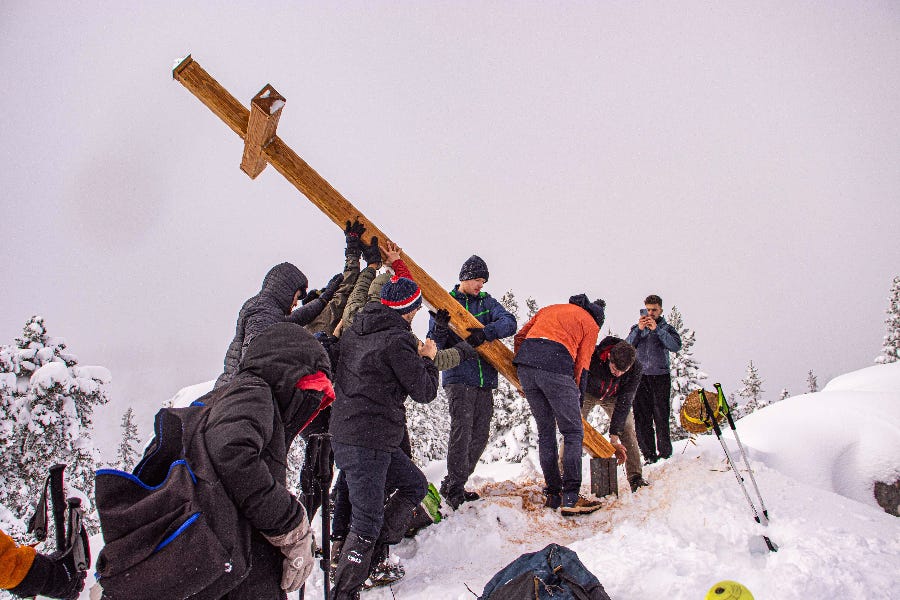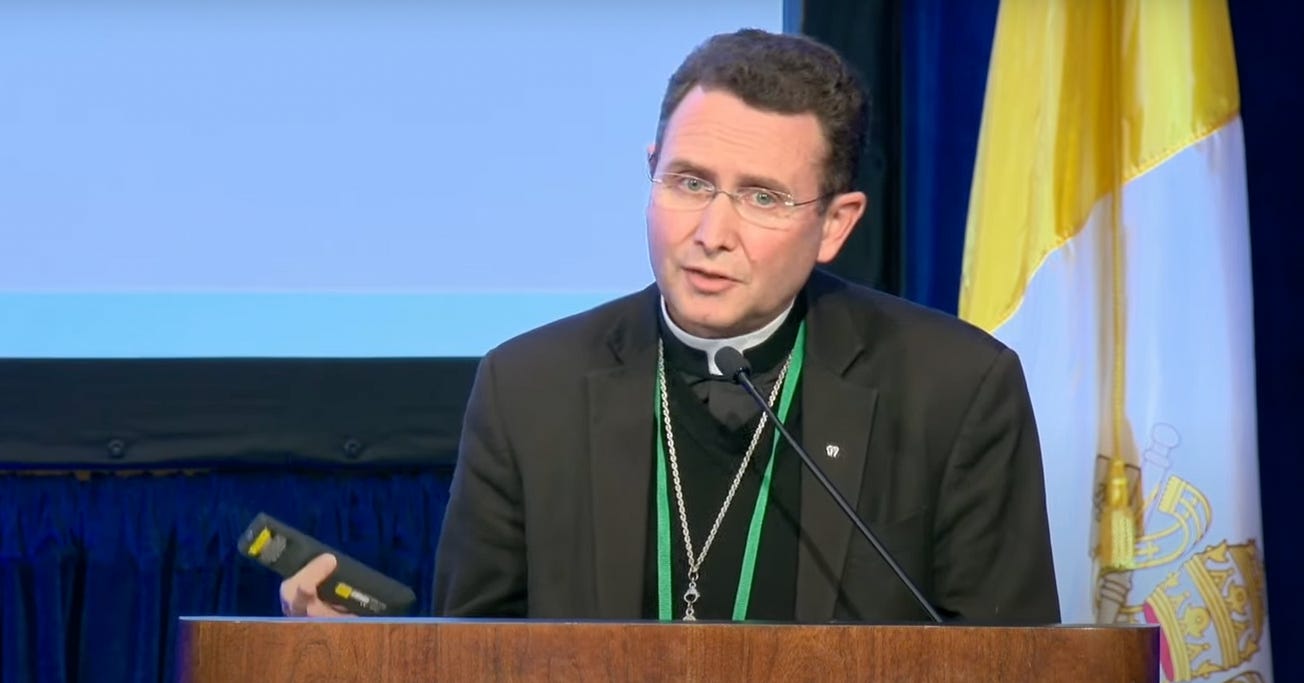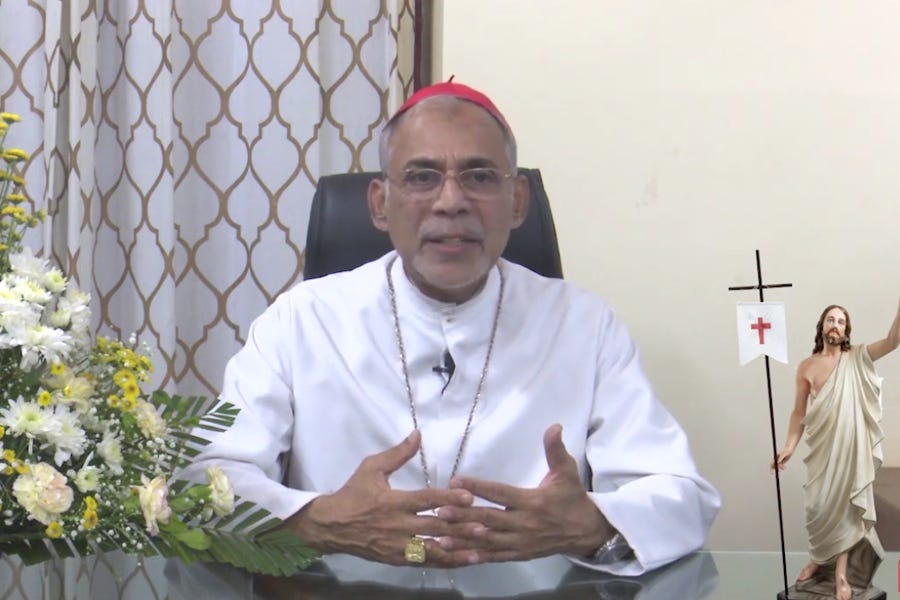During his 16 years in Congress, Catholic Dan Lipinski became one of the last pro-life Democrats serving in the House of Representatives.
Lipinski’s pro-life position drew considerable criticism within the Democratic Party. It became the focus of a tough primary challenge in 2018, which Lipinski won, and a tougher primary race in 2020, which he lost.
His final term in Congress ended Jan. 3, 2021.
Lipinski, who has a Ph.D. in political science, talked with The Pillar this week about partisanship and “Eucharistic coherence.” He also told us why he’d rather be a Catholic witness than a congressman.
This interview has been edited for length and clarity.
The Pillar: Dr. Lipinski, an outspoken pro-life Catholic Democrat has a fairly unique lens through which to observe national politics. It’s a unique lens to observe the life of the Church too, for that matter. What has been your assessment of the bishops’ debate over “Eucharistic coherence” in recent weeks?
You know, it really has helped me watching the bishops debate last week. I’m very happy that the bishops are moving forward with their teaching document. It’s clearly needed.
I think most Catholics don’t understand the teachings of the Church on the Eucharist — on Holy Communion, and the reception of Holy Communion. I’ve learned more, and I know that there’s more for me to learn. It really made me think more seriously about receiving Holy Communion, and preparing to receive Holy Communion.
And then seeing that “Statement of Principles” come out… well, that statement surprised me.
[ed note: Shortly after the U.S. bishops announced last week that they had approved the drafting of a text on the Eucharist, 60 Catholic Democrats in Congress released a “Statement of Principles,” which acknowledged their “disagreement with the Church in some areas,” and urged that the bishops not prohibit pro-choice Catholic lawmakers from receiving the Eucharist.]
I would not have expected that the 60 members of Congress would so quickly come out with that. I wonder where it originated from.
And that’s the first thing that went through my mind is, “Where did that come from? Who felt the need to do that? Was it one of the members [of Congress]? Was it someone on the outside?”
But that did surprise me. It was a statement of what has been said and implied through the years by some members of Congress, but I had never seen it put together, and I was just surprised that these 60 members came out and said that. But I guess someone felt there was a need to put that out there and these members believed they needed to sign that.
With the bishops’ debate and this letter coming out, I went back and I looked at the 2006 document that the USCCB had put out on the Eucharist.
And I didn’t realize how clear that that document was about who should refrain from from Holy Communion. It surprised me to some extent that that document was put out there, and then it really sort of just disappeared.
And I hope that all Catholics are in the position of looking at themselves, and their own understanding of the Eucharist, and of receiving Holy Communion, and the seriousness with which with which each of us should take that.
I published an essay this week in “First Things” about some of the challenges politicians are facing, because I wanted people to understand the perspective of a Catholic politician. And I'm not excusing excusing anything here; but I want to make sure the bishops understand what politicians are up against, and the challenges.
What are some of those challenges?
Well, I was in Congress for 16 years, and everyone tries to fudge things, and doesn’t want to have make any trade-offs.
I knew [as a pro-life Democrat] the position I was putting myself in within the party. It didn’t start out that way, but I knew the last four years I was in Congress how much it had become unacceptable for an elected official in the Democratic Party to take the position that I took on abortion and other issues that are important to me as a Catholic.
I made the decision that I made. I never thought, from when I was first elected, that it was going to be easy to be a pro-life Democrat, but I never expected it to be as difficult as it became. But I was never going to give that up.
Going through all that, and then writing about it, has been really good for me. It made me think much more deeply about this, and reflect on the fact that I need to learn more and take this more seriously.
How the bishops go about teaching, that’s up to them. And I know, obviously, there's a lot of disagreement among the bishops, and I understand those who feel that they don't want to push these politicians away.
I was a teacher before I ran for Congress; I was a college professor for four years. I know that sometimes there are ways of teaching that are not popular with your students. And I know the bishops are considering how best to teach about the Eucharist. But there is no question to me that they need to do better jobs teaching about this.
You’ve written and spoken about partisanship, and about the difficulties that a Catholic pro-life Democrat faces — obviously, a lot of money was spent by people within your own party to challenge you in Democratic primaries, both in 2018 and in 2020.
I suspect a Catholic pro-life Republican pushing to restore a moratorium on the federal death penalty, for example, or pushing for abolishing the federal death penalty altogether, would face some obstacles within his own party.
So that leaves me wondering whether money and partisan orthodoxies make it nearly impossible for a Catholic to occupy elected office at the national level? How can that be navigated?
I have really come to believe that the partisan divide is a sectarian divide— the two parties have become religions with sets of doctrine that you must agree with, or else you get accused of apostasy.
Catholics don't fit into either of these two sides. We don't fit completely into these two sides. And I think that makes Catholics uniquely gifted to try to bridge this divide. But it's very difficult because everyone is basically forced into choosing one of these two, especially if you're in elected office, and basically you have to choose one of these two parties. It is extremely difficult if you step out of line.
As I look at this, I don't think our country can survive the way things are right now with our sectarian partisan divide. I don't think it's possible to survive because it's impossible to work together.
And I think it's especially difficult for Catholics. But it doesn't mean that we can just cede the public square; we've got to keep working to bring the truth forward.
I'm hopeful that my witness is a positive one, and people take something good out of that. I hope other people stand up. I hope people don't take out of my experience that Catholics need to get out, because we absolutely have to be in the public square.
We have to be in the public and political arena. But it's incredibly difficult right now.
That difficulty seems compounded if you’re in public office.
Yes. I mean, it's not easy for the average American, because they're constantly being presented with two choices: you've got to choose one or the other, and if you don't fit neatly in with one it's problematic.
But if you're in elected office, you have people who are always looking, and anyone who steps out of the line is punished. And that punishment is basically ending someone's political career.
I really believe that pretty much everyone who's involved in politics is doing it because they want to do good, even if sometimes they have a wrong idea of what good is. But people in public offices don't want to lose those offices and their livelihoods, and so the stakes become very personal and very difficult.
You’re a political scientist with a serious academic background and usually a measured way of talking about politics. So when you talk about partisanship fracturing our country, or the United States not surviving that, I suspect you mean that seriously. But it’s a very grave observation.
We are always going to have political parties, and parties are essential for representative democracy to work. But it’s the type of parties that we have, in which compromise is not allowed — it’s sectarian. We think the other side is evil, and you can’t work with evil.
But our Constitution was written because Madison believed that you needed to compromise. The parties of today do not allow for the government set up under our Constitution to work. The idea of our bicameral legislature, with different ways of being elected, and then a distinct executive branch sharing power, was to force deliberation and compromise.
The idea was that representatives representing the diversity of the country would come together and bring a diversity of ideas, and the interests of their constituents, and you’d deliberate, and through deliberation you would forge policy.
And today we have two accepted views; you have two parties, with top-down leadership in those parties who say what you have to stand for if you’re a member of that party, and so we don’t have representation like we’re supposed to have.
And because of this we don’t have deliberation — no one is deliberating in Congress anymore — there’s no real back and forth, give and take, or at least it’s very rare. And so our country doesn’t work. We’re very evenly divided right now and Congress can get almost nothing done. This means that presidents are grabbing more power and the courts are grabbing more power, and nothing in our country can work that way.
I should stop there — because I’ve written a few things about this and I could go on for quite a while about this.
You mentioned to me that Catholics have unique gifts to offer the public square under those circumstances? What are they? What’s the role you see Catholics playing right now?
Well, first of all, the fact that we don’t fit neatly into either party. And for us as Catholics, the most important thing is the dignity of every individual. I think the way politics is waged today, you don’t see respect for the dignity of those who are on the other side. And it’s tough, because when you’re in there, and you’re having to battle, and so much of it is ad hominem attacks, it’s tough to remember that we put that dignity first. But we do and we have to.
And then Catholic social teaching, which is often misused greatly. And honestly, I always took Catholic social teaching for granted and I didn’t realize, until I started digging into it, how unique the Catholic Church is with our Catholic social teaching.
It is the application of our faith to policy, and to how we should be treat treating others. You know, the specificity of Catholic social teaching is something that we need to really understand — truly understand, not just use it as a weapon for the side that we take — but we need to try to live it out, and live all of it out.
There are basically two lenses now through which look at the world — left and right. But I think that Catholics have a third way, which really is the truth, and it’s well formed.
And I think it would be very attractive to people if we get out there and, instead of falling into the trap of choosing one side or the other, choose to truly be Catholic.
There’s a cost to that third way, politically. And it seems like you’ve experienced that.
But let’s take an example of how that plays out, and how the bishops fit in. I want you to help me and our readers think about a hypothetical situation.
There is a bill in Congress now, the Women’s Health Protection Act, which would expand dramatically federal legal protections for abortion.
Suppose the bill makes it out of committee. And suppose the bishops make clear that a Catholic in good conscience can’t vote for the bill, and some say even that a Catholic in Congress who votes for the bill should not receive Holy Communion.
Well, let’s say that a number of Catholics in Congress listen to the bishops — and maybe some who were with the Church’s views on other issues, but not on abortion until that vote. But what if because they take a stand, they face what you faced: A large pro-abortion lobby bankrolls a challenger in the primary. And so a bunch of them lose their seats, and maybe they lose to people who are more hostile to the Church’s positions on life, human dignity, the family, and other things. What if they lose their seats to people with whom there is almost no common ground for believers?
I think a lot of people would say that’s not an especially good outcome — that it would not be good for our country to lose people who have some common ground with the Church. That it might accelerate very problematic agendas on other issues that matter to the Church.
How do you think about that balancing act?
As I said earlier, I hope that my witness was of some value.
I certainly have no regrets whatsoever for what I did [as a pro-life Democrat].
I understand the argument which says that if you have someone who is on the right side 90% of the time, and you lose them to someone who’s not with you 90% of the time, some people would look at that and call it a loss. But if no one ever stands up for the principle that abortion is the taking of an innocent human life, then eventually, who’s going to believe it anymore?
And, you know, that's the power of witnesses.
In the Catholic Church, we have understood for 2,000 years the importance of witnesses.
I have learned over the years more about St. Thomas More, and not too long ago I saw a quote from G.K. Chesterton, who said back in 1929 that Thomas More “is important today, but he is not as important now as he will be in 100 years from today.”
And today, because of the challenges we have, I think he is. If no one ever stands up for truth in public, we won’t have those witnesses.
Until I went through a tough primary in 2018, I never looked at myself in that light. I thought I was a guy doing an important job. I was Catholic; I was always going to be pro-life, but that's not why I ran for office. It was incredibly important to me, but that wasn't my reason for running and for being there.
I never realized until during and after that 2018 primary that there were a lot of people who were watching me and that I meant something to them, and there were people who appreciated that I took a stand and wouldn’t back down. And like I said, I never thought of that before. I didn't think of that as important.
And I’m not trying to puff myself up, but I realized what kind of responsibility that was, and the impact I could have. And after that 2018 primary, I really started looking more to the future and saying I wanted to do more to evangelize, especially young people — having been a college professor.
I started going and speaking to more college students, I spoke at FOCUS, and I really think it's important what I can provide and hopefully the inspiration that I can provide to others, especially young Catholics, to be faithful, and not give in.
And I hope that’s what people learn from my experience. I hope they don't learn: “Don't stand on principle or else you're going to lose,” because that’s not the lesson.
It sounds like part of the lesson for you has been that if you’re standing on principle, losing isn’t really the most important thing.
That’s right.
I don't want people to think that I don't care that I lost. Or that I didn't care about being there. I loved it. I miss it — although I would miss it even more if it weren't for the fact that everything's so much run from the top-down, which was extremely frustrating.
But I am much more at peace now. And I feel like I have the opportunity to make even more of a difference, maybe, than if I was still there in Congress. Because what’s most meaningful to me — you know — it’s evangelization.





